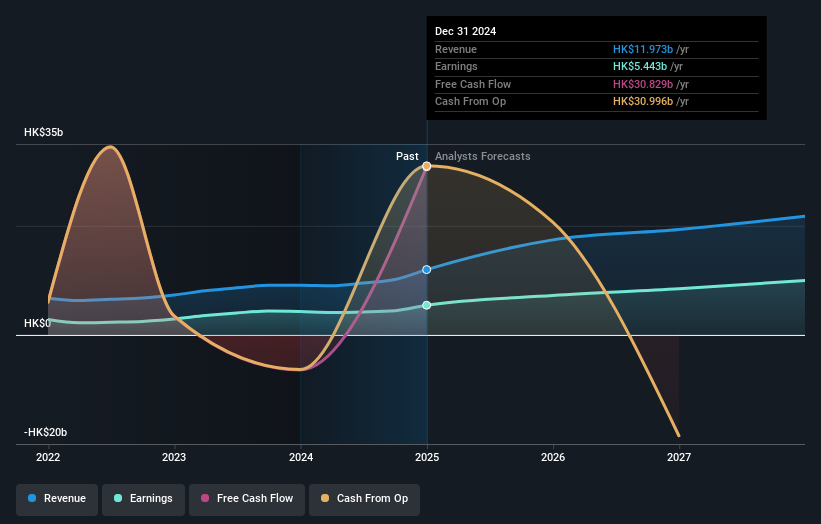- United States
- /
- Capital Markets
- /
- NasdaqGM:FUTU
Futu Holdings Limited's (NASDAQ:FUTU) CEO Hua Li is the most upbeat insider, and their holdings increased by 9.9% last week

Key Insights
- Futu Holdings' significant insider ownership suggests inherent interests in company's expansion
- 57% of the business is held by the top 2 shareholders
- Institutional ownership in Futu Holdings is 28%
To get a sense of who is truly in control of Futu Holdings Limited (NASDAQ:FUTU), it is important to understand the ownership structure of the business. We can see that individual insiders own the lion's share in the company with 36% ownership. That is, the group stands to benefit the most if the stock rises (or lose the most if there is a downturn).
As a result, insiders scored the highest last week as the company hit US$16b market cap following a 9.9% gain in the stock.
Let's take a closer look to see what the different types of shareholders can tell us about Futu Holdings.
See our latest analysis for Futu Holdings

What Does The Institutional Ownership Tell Us About Futu Holdings?
Institutions typically measure themselves against a benchmark when reporting to their own investors, so they often become more enthusiastic about a stock once it's included in a major index. We would expect most companies to have some institutions on the register, especially if they are growing.
Futu Holdings already has institutions on the share registry. Indeed, they own a respectable stake in the company. This implies the analysts working for those institutions have looked at the stock and they like it. But just like anyone else, they could be wrong. When multiple institutions own a stock, there's always a risk that they are in a 'crowded trade'. When such a trade goes wrong, multiple parties may compete to sell stock fast. This risk is higher in a company without a history of growth. You can see Futu Holdings' historic earnings and revenue below, but keep in mind there's always more to the story.

Futu Holdings is not owned by hedge funds. The company's CEO Hua Li is the largest shareholder with 36% of shares outstanding. For context, the second largest shareholder holds about 20% of the shares outstanding, followed by an ownership of 2.4% by the third-largest shareholder.
To make our study more interesting, we found that the top 2 shareholders have a majority ownership in the company, meaning that they are powerful enough to influence the decisions of the company.
While studying institutional ownership for a company can add value to your research, it is also a good practice to research analyst recommendations to get a deeper understand of a stock's expected performance. Quite a few analysts cover the stock, so you could look into forecast growth quite easily.
Insider Ownership Of Futu Holdings
While the precise definition of an insider can be subjective, almost everyone considers board members to be insiders. The company management answer to the board and the latter should represent the interests of shareholders. Notably, sometimes top-level managers are on the board themselves.
I generally consider insider ownership to be a good thing. However, on some occasions it makes it more difficult for other shareholders to hold the board accountable for decisions.
It seems insiders own a significant proportion of Futu Holdings Limited. It has a market capitalization of just US$16b, and insiders have US$5.7b worth of shares in their own names. That's quite significant. Most would be pleased to see the board is investing alongside them. You may wish to access this free chart showing recent trading by insiders.
General Public Ownership
The general public, who are usually individual investors, hold a 15% stake in Futu Holdings. This size of ownership, while considerable, may not be enough to change company policy if the decision is not in sync with other large shareholders.
Public Company Ownership
It appears to us that public companies own 20% of Futu Holdings. It's hard to say for sure but this suggests they have entwined business interests. This might be a strategic stake, so it's worth watching this space for changes in ownership.
Next Steps:
I find it very interesting to look at who exactly owns a company. But to truly gain insight, we need to consider other information, too.
Many find it useful to take an in depth look at how a company has performed in the past. You can access this detailed graph of past earnings, revenue and cash flow.
Ultimately the future is most important. You can access this free report on analyst forecasts for the company.
NB: Figures in this article are calculated using data from the last twelve months, which refer to the 12-month period ending on the last date of the month the financial statement is dated. This may not be consistent with full year annual report figures.
New: AI Stock Screener & Alerts
Our new AI Stock Screener scans the market every day to uncover opportunities.
• Dividend Powerhouses (3%+ Yield)
• Undervalued Small Caps with Insider Buying
• High growth Tech and AI Companies
Or build your own from over 50 metrics.
Have feedback on this article? Concerned about the content? Get in touch with us directly. Alternatively, email editorial-team (at) simplywallst.com.
This article by Simply Wall St is general in nature. We provide commentary based on historical data and analyst forecasts only using an unbiased methodology and our articles are not intended to be financial advice. It does not constitute a recommendation to buy or sell any stock, and does not take account of your objectives, or your financial situation. We aim to bring you long-term focused analysis driven by fundamental data. Note that our analysis may not factor in the latest price-sensitive company announcements or qualitative material. Simply Wall St has no position in any stocks mentioned.
About NasdaqGM:FUTU
Futu Holdings
Provides digitalized securities brokerage and wealth management product distribution service in Hong Kong and internationally.
Very undervalued with excellent balance sheet.
Similar Companies
Market Insights
Community Narratives




